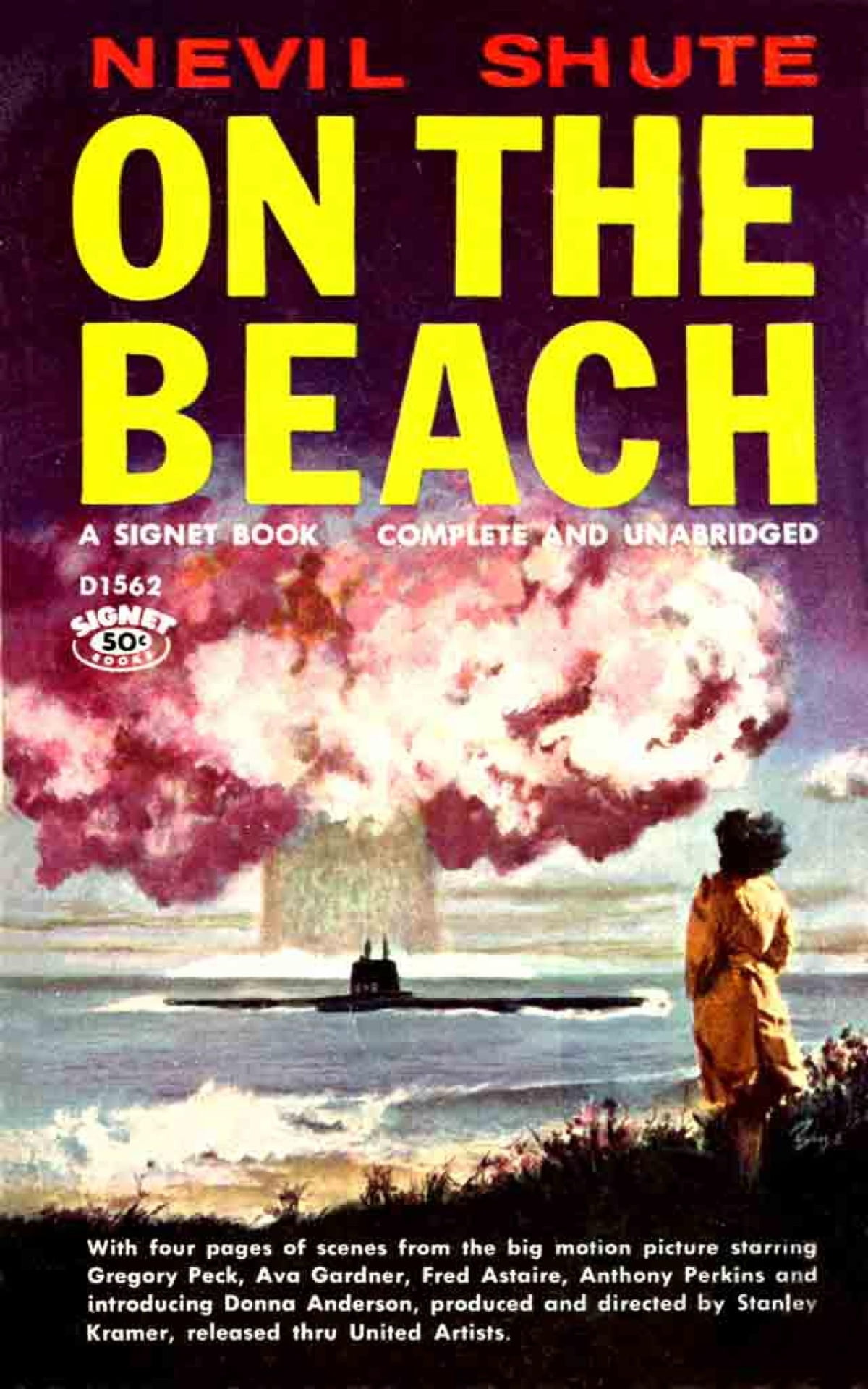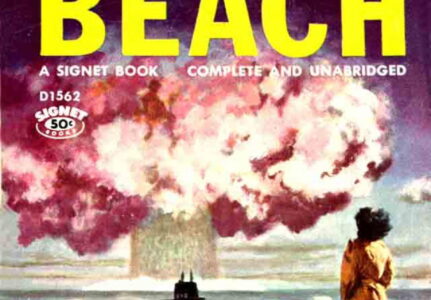In a world saturated with dystopian literature, one book stands as a timeless masterpiece that has continued to captivate readers for decades. “On the Beach” by Nevil Shute, a hauntingly beautiful and profoundly moving novel, takes us on a journey into a post-apocalyptic world where the specter of impending doom casts a shadow over the last remnants of humanity. This article delves deep into the heart of this literary gem, exploring its plot, key characters, themes, critical reception, and cultural impact. Additionally, we’ll touch on similar books and other notable works by the author, Nevil Shute.
Plot: A Bleak Glimpse into the End of the World
“On the Beach” is set in the aftermath of a devastating global nuclear war. The novel unfolds in Australia, one of the few places on Earth left untouched by the radioactive fallout. As the rest of the world succumbs to the horrors of radiation sickness, the citizens of Australia live in a state of eerie calm, knowing that their inevitable fate is sealed. The prevailing winds will eventually carry the deadly fallout south, and there is no escape.
The story primarily follows the lives of a handful of individuals living in Melbourne, where the sense of impending doom is palpable. Commander Dwight Towers, an American submarine captain, is stationed in Australia with his crew, awaiting orders that will never come. Moira Davidson, a vivacious and spirited Australian woman, captures Dwight’s heart despite the grim circumstances. Peter and Mary Holmes, an Australian couple, try to maintain a sense of normalcy for their young daughter, Jennifer, even as they grapple with the knowledge that they will soon succumb to radiation poisoning.
As the days pass and the radiation creeps closer, the characters confront their mortality in different ways. Some seek solace in the pursuit of fleeting pleasures, while others grapple with existential questions about the meaning of life in the face of certain death. Ultimately, “On the Beach” is a meditation on the human spirit’s resilience and the choices individuals make when confronted with the inevitability of their own demise.
Key Characters: Portraits of Resilience and Despair
Commander Dwight Towers
Dwight Towers is the novel’s central character, an American submarine captain stationed in Australia. He is a stoic and disciplined man who struggles to come to terms with the loss of his family in the nuclear holocaust. Towers represents the enduring human desire for connection and love in the face of overwhelming tragedy.
Moira Davidson
Moira Davidson is a spirited Australian woman who becomes romantically involved with Dwight Towers. Her vivacity provides a stark contrast to the prevailing sense of doom in Melbourne. Moira symbolizes the human capacity for joy and love even in the darkest of times.
Peter and Mary Holmes
Peter and Mary Holmes are an Australian couple trying to maintain a semblance of normalcy for their young daughter, Jennifer. Their story reflects the universal desire of parents to protect their children and shield them from the harsh realities of the world. Peter’s involvement in a risky car race serves as a poignant metaphor for the reckless behavior that can emerge when people believe they have nothing to lose.
Jennifer Holmes
Jennifer, the young daughter of Peter and Mary Holmes, represents innocence and vulnerability in the face of impending death. Her presence highlights the heartbreaking contrast between the world as it was and the world as it has become.
Key Themes: Exploring the Human Condition
The Inevitability of Death
The overarching theme of “On the Beach” is the inescapable nature of death. The characters must confront their mortality in a way that few of us ever do, and their responses to this existential crisis range from denial to acceptance. The novel forces readers to grapple with the same questions: What would you do if you knew your time was limited? How would you find meaning in a world that is swiftly coming to an end?
Love and Connection
Amidst the despair, love and connection emerge as powerful forces in the lives of the characters. Dwight and Moira’s budding romance serves as a beacon of hope, illustrating that even in the darkest times, human connection can bring solace and purpose.
The Fragility of Civilization
The novel paints a stark picture of the fragility of civilization. The destructive power of nuclear weapons and the ease with which they can bring about the end of the world serve as a cautionary tale. “On the Beach” reminds us of the grave consequences of unchecked aggression and the importance of global cooperation to prevent such a catastrophe.
Moral Dilemmas
As the characters face their imminent demise, they grapple with moral dilemmas. Some choose to indulge in hedonistic pleasures, while others maintain their sense of duty and responsibility. These choices prompt readers to reflect on the moral decisions they might make when faced with a similar situation.
Reviews and Cultural Impact: A Lasting Impression
Upon its release in 1957, “On the Beach” received widespread critical acclaim. The novel’s poignant exploration of human nature in the face of annihilation struck a chord with readers and critics alike. Nevil Shute’s masterful storytelling and his ability to evoke profound emotions earned the book a place in the pantheon of classic literature.
The novel’s cultural impact was far-reaching. It sparked discussions about the consequences of nuclear war and the urgent need for disarmament during the Cold War era. “On the Beach” also inspired a 1959 film adaptation starring Gregory Peck and Ava Gardner, which brought the story to an even wider audience.
In the decades that followed, the novel continued to resonate with readers, finding relevance in discussions about climate change, existential threats, and the human capacity for both destruction and resilience. It remains a staple in literature courses and book clubs, where its timeless themes continue to provoke thought and discussion.
Similar Books: Exploring the Genre
While “On the Beach” occupies a unique place in the post-apocalyptic genre due to its focus on the emotional and psychological aspects of survival, there are several other notable books that explore similar themes:
“The Road” by Cormac McCarthy
Cormac McCarthy’s “The Road” is a haunting tale of a father and son’s journey through a desolate, post-apocalyptic world. Like “On the Beach,” it delves into the profound challenges and moral dilemmas faced by survivors in a world stripped of its humanity.
“Station Eleven” by Emily St. John Mandel
“Station Eleven” takes a different approach to the post-apocalyptic genre, weaving together multiple narrative threads to explore the interconnectedness of human lives before and after a devastating flu pandemic. It’s a story of resilience, art, and the enduring power of culture.
“The Handmaid’s Tale” by Margaret Atwood
Margaret Atwood’s dystopian classic, “The Handmaid’s Tale,” envisions a future where a theocratic regime has stripped women of their rights. While not post-apocalyptic in the traditional sense, it explores the consequences of extreme ideologies and serves as a cautionary tale.
Other Books by Nevil Shute: Exploring the Author’s Work
Nevil Shute, a British-Australian novelist and aeronautical engineer, wrote several other novels worth exploring:
“A Town Like Alice” (1950)
This novel tells the story of a young Englishwoman’s harrowing experiences during World War II in Malaya and her later efforts to transform a remote Australian town.
“No Highway” (1948)
In “No Highway,” Shute combines his expertise in aeronautical engineering with storytelling prowess. The novel follows an aviation engineer who discovers a flaw in a new aircraft’s design that could lead to catastrophic crashes. It’s a gripping tale of scientific discovery and moral responsibility.
“Pied Piper” (1942)
Set during World War II, “Pied Piper” revolves around an elderly Englishman’s journey through Nazi-occupied France as he helps a group of children escape to safety. This novel explores themes of courage, compassion, and the resilience of the human spirit in the face of adversity.
“The Chequer Board” (1947)
“The Chequer Board” delves into the lives of four war veterans from different backgrounds who form a unique friendship. Shute explores themes of post-war adjustment, the healing power of friendship, and the importance of understanding and empathy.
“Requiem for a Wren” (1955)
This novel follows the life of a young woman who joins the Women’s Auxiliary Air Force during World War II. It delves into the challenges faced by women in the military and the emotional toll of war on individuals and their families.
Nevil Shute’s body of work often combines his technical knowledge with a deep understanding of human nature. His novels are characterized by their compelling characters, moral dilemmas, and exploration of themes such as love, resilience, and the impact of war on ordinary people.
On the Beach
“On the Beach” by Nevil Shute is a literary masterpiece that continues to captivate readers with its exploration of the human condition in the face of impending doom. Through its well-crafted plot, memorable characters, and thought-provoking themes, the novel invites us to contemplate our own mortality and the choices we make in the shadow of catastrophe.
As we delve into the lives of Commander Dwight Towers, Moira Davidson, Peter and Mary Holmes, and young Jennifer, we are reminded of the enduring power of love, connection, and the human spirit. Shute’s ability to evoke deep emotions and his exploration of moral dilemmas have solidified “On the Beach” as a classic of post-apocalyptic literature.
Moreover, the novel’s cultural impact, critical acclaim, and enduring relevance in discussions about global threats and human resilience attest to its lasting significance. In a world where the specter of nuclear war and other existential threats still looms, “On the Beach” serves as a sobering reminder of the consequences of our actions and the importance of finding meaning in the face of uncertainty.
Whether you’re a longtime fan of Nevil Shute’s work or discovering “On the Beach” for the first time, its exploration of the human spirit in the face of annihilation is sure to leave a lasting impression. As you turn the pages and immerse yourself in this haunting world, you’ll find yourself reflecting on your own journey through life and the choices you make along the way.


